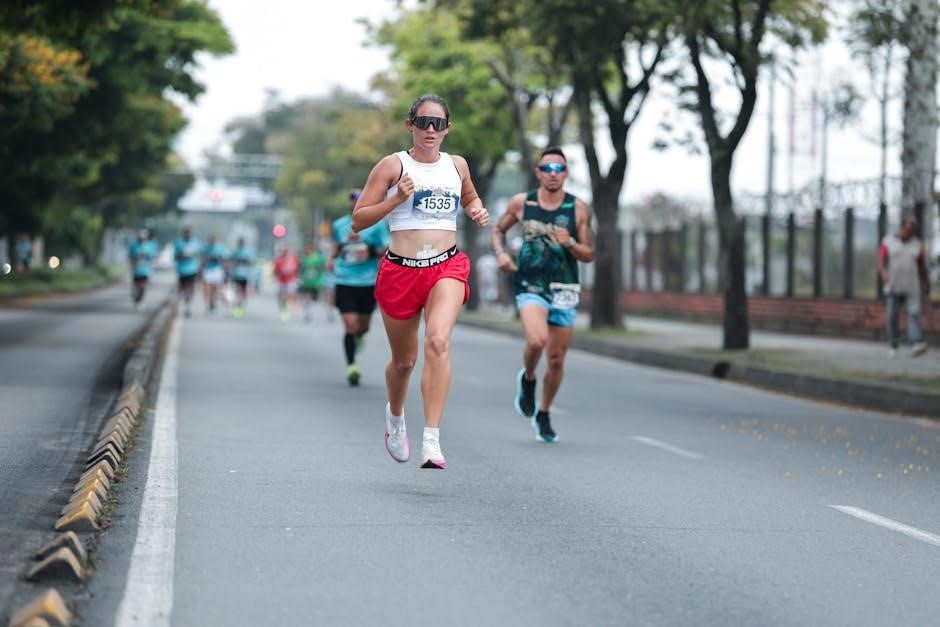This structured nutrition plan is designed to optimize athletic performance, ensuring balanced macronutrients for energy, recovery, and overall health․ Each meal is carefully crafted to fuel workouts and support muscle growth, providing a clear roadmap for peak physical conditioning․
Overview of Nutritional Needs for Athletes
Athletes require a balanced diet that provides adequate energy, supports muscle recovery, and enhances performance․ The nutritional needs vary based on factors like age, sport, and training intensity, but the core focus remains on macronutrient balance․ Carbohydrates are the primary energy source, while protein is essential for muscle repair and growth․ Healthy fats play a critical role in hormone production and overall health․ Proper hydration is also vital, as even mild dehydration can impair performance․ Athletes should avoid processed foods and sugary drinks, opting instead for whole, nutrient-dense meals․ Timing meals around training sessions is equally important, with pre-workout meals providing sustained energy and post-workout nutrition aiding recovery․ A well-structured meal plan ensures athletes meet their calorie and nutrient needs, supporting both performance and recovery․ This 7-day meal plan is tailored to provide balanced nutrition, with specific attention to macronutrient ratios and meal timing to optimize results․
Understanding Macronutrient Balance
Athletes need a balanced intake of carbohydrates, protein, and healthy fats․ Carbohydrates fuel workouts, protein aids muscle recovery, and fats support hormone production․ A tailored macronutrient ratio ensures optimal energy and performance․

Carbohydrates for Energy
Carbohydrates are the primary energy source for athletes, essential for high-intensity workouts and endurance․ Complex carbs like whole grains, fruits, and vegetables provide sustained energy, while simple carbs offer quick fuel during activities․ Timing is crucial; consuming carbs 1-3 hours before exercise maximizes glycogen stores․ Post-workout, carbs help replenish energy reserves and support recovery․ A balanced intake ensures consistent performance without energy crashes․ Athletes should prioritize whole, unprocessed sources to maintain stable blood sugar levels and avoid unnecessary additives․ Proper carbohydrate intake tailored to training intensity and duration is vital for achieving peak performance and preventing fatigue․

Protein for Muscle Recovery
Protein is essential for muscle repair and growth, making it a cornerstone of an athlete’s diet․ It helps rebuild muscle tissue damaged during intense workouts, promoting recovery and strength gains․ Athletes require 1․2–2․2 grams of protein per kilogram of body weight daily, depending on training intensity and goals․ High-quality sources like lean meats, fish, eggs, dairy, and plant-based options such as legumes and tofu are ideal․ Timing matters: consuming protein within 30–60 minutes post-workout, along with carbohydrates, enhances recovery by stimulating muscle synthesis․ Additionally, spreading protein intake evenly across meals ensures a steady supply of amino acids for tissue repair․ Adequate hydration and pairing protein with complex carbs further optimize its benefits․ Prioritizing protein-rich foods supports long-term muscle health and performance, making it a critical component of an athlete’s meal plan․

Healthy Fats for Hormone Production

Healthy fats are vital for hormone production and overall physiological function in athletes․ They support the synthesis of hormones like testosterone and estrogen, which are crucial for muscle growth, energy, and recovery․ Sources like avocados, nuts, seeds, olive oil, and fatty fish (rich in omega-3s) are ideal․ These fats also aid in the absorption of fat-soluble vitamins (A, D, E, and K), which are essential for immune function and bone health․ Incorporating moderate amounts of healthy fats into meals helps sustain energy levels and supports brain function․ For athletes, maintaining the right balance of fats is key to optimizing hormonal health and performance․ Avoiding unhealthy fats, such as trans fats, is equally important to prevent inflammation and maintain cardiovascular health․ By prioritizing quality fat sources, athletes can ensure their bodies function at peak levels, both on and off the field․

Sample 7-Day Meal Plan
This meal plan provides a detailed structure for athletes, including breakfast, lunch, snacks, and dinner options each day, tailored to support energy, performance, and recovery with balanced nutrition․
Day 1: Breakfast, Lunch, Snack, Dinner

- Breakfast: Greek yogurt with mixed berries, granola, and a drizzle of honey, paired with a glass of orange juice for a refreshing start․
- Mid-Morning Snack: Apple slices with peanut butter, providing a boost of healthy fats and complex carbohydrates․
- Lunch: Grilled chicken breast with quinoa, steamed vegetables (broccoli, carrots), and a side of avocado for essential nutrients․
- Afternoon Snack: Protein smoothie with spinach, banana, almond milk, and a scoop of whey protein to maintain energy levels․
- Dinner: Baked salmon with sweet potato mash, asparagus, and a light salad, ensuring a balanced intake of omega-3 fatty acids and fiber․
This meal plan focuses on lean proteins, complex carbs, and healthy fats, tailored to support athletic performance and recovery throughout the day․


Day 2: Breakfast, Lunch, Snack, Dinner
- Breakfast: English muffin with peanut butter and banana slices, accompanied by a glass of soy milk for sustained energy and protein․
- Mid-Morning Snack: A protein bar and apple slices, providing a quick energy boost and fiber intake․
- Lunch: Turkey and avocado wrap with mixed greens, served with baby carrots and hummus for a balanced mix of carbs, protein, and healthy fats․
- Afternoon Snack: A handful of mixed nuts and dried fruit, offering a natural source of energy and essential nutrients․
- Dinner: Grilled shrimp with quinoa, steamed green beans, and a side of olive oil dressing, ensuring a lean protein and complex carbohydrate intake․
This meal plan emphasizes variety and nutrient-dense foods, supporting energy levels and muscle recovery while maintaining a balanced diet for optimal athletic performance․
Meal Prepping Tips
Plan meals weekly, portion control, and store in airtight containers․ Set timers for grains to cook multiple meals․ Stay hydrated with water and electrolytes․ Consider supplements like protein powder for recovery․
Benefits of Meal Prepping for Athletes
Meal prepping offers numerous advantages for athletes, ensuring consistent nutrition and saving time during busy training schedules․ It helps maintain a balanced diet, avoiding unhealthy food choices, and supports muscle recovery․ By preparing meals in advance, athletes can control portion sizes and macronutrient intake, optimizing energy levels and performance․ Additionally, meal prepping reduces food waste and saves money․ It also minimizes the risk of mindless grazing, keeping athletes on track with their dietary goals․ With a structured plan, athletes can ensure they meet their daily calorie needs while fueling their bodies for peak performance․ This proactive approach to nutrition is essential for maintaining energy, recovery, and overall health, making it a cornerstone of any successful training regimen․
Hydration and Supplement Considerations
Proper hydration is crucial for athletic performance, as even mild dehydration can impair energy levels and recovery․ Athletes should drink plenty of water throughout the day, aiming for 8-10 glasses, and consider electrolyte-rich beverages during intense workouts to replenish lost salts․ Additionally, supplements can play a role in optimizing performance․ Protein powder is a popular choice for muscle recovery, while creatine can enhance strength and endurance․ Multivitamins ensure athletes meet daily nutrient needs, especially if their diet is restrictive․ Omega-3 fatty acids support inflammation reduction and heart health․ However, athletes should consult a nutritionist before adding supplements to avoid overconsumption or interactions with medications․ A balanced diet should always be the primary source of nutrients, with supplements serving as a targeted support system․ Prioritizing hydration and strategic supplementation can elevate performance, accelerate recovery, and maintain overall well-being for athletes․
